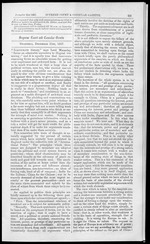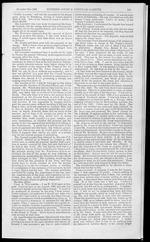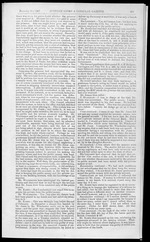| 1 |
 |
“...SUPREME COURT & CONSULAR
And Law Reporter for the Supreme & Provincial Courts of China & Japan
Vol. II ’ SHANGHAI, SATURDAY, 21st DECEMBER, 1867. No. 51
CONTENTS.
Leading Article.
International Policy, ..........
Cases in H. B. M.’s Supreme Court.
Regina v. C. T. J ones..........
Summary Cases, .................
Page.
253
254
Page.
Police Cases,.................................
News of the Week,....................... 2G0
Commercial Summary, .................... 262
Shipping, Quotations, Ac., &c........... 262
Meteorological Table, Causes for Hearing, &c 262
N 0 T I FIC A T I 0 N S
British Legation Japan.
COPY OP REPLY FORWARDED TO THE
YOKOHAMA CHAMBER OF COMMERCE.
H. B. M.’s Legation.
Yedo, December 9th, 1867.
Sir,
I have the honour to acknowledge the receipt of
your despatch of the 7th instant, forwarding, hy re-
quest of the Chairman of the Yokohama General Cham-
ber of Commerce, a letter from that gentleman, dated
the 5tli instant, in which he encloses a report of a Com-
mittee of the...”
|
|
| 2 |
 |
“...munication, and will take the usual steps for giving
it publicity in your district.
I am, Sir,
Your most obedient, humble servant,
HARRY S. PARKES.
To F. G. Myburgh, Esq.,
H. MFs Consul, Kanagawa.
H. B. M.’s SUPREME COURT FOR CHINA
AND JAPAN.
NOTICE.—It is hereby notified that the sittings of
the Supreme Court for hearing Civil Cases during
the month of weatf will be held on Tuesdays
lAth, 2\st and 2§th days of that month respectively ;
and for Motions Applications, &c., on Fridays the
17^/i, 24£/i and 31s£ proximo.
Shanghai, 19fch December, 1867,
IN HER BRITANNIC MAJESTY’S SUPREME
COURT FOR CHINA AND JAPAN.
THE BANKRUPTCY ACT, 1861.
Shanghai, 13^A December, 1867.
WHEREAS a petition for the adjudication of
Bankruptcy, was on the 12th day of December
1867, filed in Her Britannic Majesty’s Supreme Court
for China and Japan at Shanghai, by Charles William
Mathew Hudson, under which lie has been adjudged
Bankrupt.
The said Charles William Mathew H udson is here-
by required to surrender himself io...”
|
|
| 3 |
 |
“...December 21s£ 1867.
SUPREME COURT & CONSULAR UAZUTTe.
253
ft is requested that only such communications as relate to
Editorial matters be addressed to the Editor, and that they
be sent not later than Friday.
Advertisements will be received till 10 a.m. on Saturday
No communications can be noticed unless accompanied by
the name of theivr iter.
Supreme &oad oi> Consular
Shanghai, December 21st, 1867.
“ Inaccurate history,” says Lord Macaulay,
“ forms an admirable corrective to illogical rea-
soning ;” and it is equally true that inaccurate
reasoning forms an admirable means for getting
over unpleasant and awkward facts. It is not
to be much wondered at that a large class of
political writers, men too, who succeed marvel-
ously in catching the public ear, are often dis-
posed to slur over obvious considerations that
tell against their tenets, to give a false coloring
to those which may be used as an argument either
on one side of a subject or another, and finally
to exaggerate to a preposterous...”
|
|
| 4 |
 |
“...254
SUPREME COURT & CONSULAR GAZETTE.
December 21st i8fi7r
——
Vve might perhaps consider it an exercise of
right, bub this ground is unfortunately cut from
under our feet as we are told at the outset that
t( all arguments which ultimately involve the
doctrine of the rights of a nation, are put aside
as irrelevant and futile.Taking this ground
then, we are forced to admit, though we do so
with much reluctance, that China has not the
right to refuse a request any more than we have
the right to make one; and we find that the sen-
tentious utterings of the philosophical oracle form
no practial guide to us in our relations with
foreign countries, excepting so far as they are a
general recommendation that we had better have
nothing to do with them.
To this grand conclusion, in fact, the whole of
the “ International Policy ” essays directly tend;
and there is only one consolation in reading the
book, which is, that if its principles were earned
out, there- could by no possibility be the neces-...”
|
|
| 5 |
 |
“...December 21#2 1867.
SUPREME COURT & CONSULAR GAZETTE.
255
'‘Public Account,” and left the accounts in his charge
upon going to Hongkong, having of course implicit
faith in him. But on his return he found a deficit of
about {$6,000.
His Lordship was very sorry to interrupt the learn-
ed Counsel, but the charge referred only to two specific
amounts, not to the general deficit, and therefore that
ought not to be argued upon.
Mr. Myburgh explained that the amount of deficit
would go to shew the intent ; if the total deficit was
large, it would appear clear that there was an intent
to defraud.
Mr. Eames said there were only two grounds of the
charge. Half a dozen other grounds might perhaps be
argued upon if facts not specifically charged were
brought forward.
His Lordship considered that it would not be right
to discuss the general deficiency as the argument might
wrongly affect the Jury.
Mr. Myburgii bowed to the ruling of the Court, and
continued to observe that as he had stated in Septem-...”
|
|
| 6 |
 |
“...256
SUPREME COURT & CONSULAR GAZETTE.
December 21st 1867
and any loose memoranda. There were blank* left to
allow Mr. Jones to put in amounts as they were dis-
covered. The amounts in dispute were not in existence
when the memo, was given me in Aug. 1865. I had on
cei’tain knowledge of any bank account being kept by
Mr. Jones until the 18th December, when I remitted
the amount to Mr. Frazar. It is very likely that I
was not so acute as I might have been, but I have no
recollection of having my attention called to the fact
till the payment to the Court. The change was made
on the 6th February. One sum was received on 2nd
December, the other 26th January. There were live
or six estates left by the Court in charge of the Con-
sulate. I am certain I told Mr. Jones that only those
were under the management of the Consulate. These
accounts were under different headings. One was that
of distressed seamen.
This is the “ Funeral Book.” It contains an entry,
*'T. Hitchcock, Tls. 8.” “ The funeral...”
|
|
| 7 |
 |
“...December '21st 1867.
SUPREME COURT & CONSULAR GAZETTE.
257
there was room for grave doubt whether the prisoner
ever received it. Because the order was paid to some
one, it did not follow that the money was received by
the prisoner. Any one might have gone and cashed
the order, after it had been signed by the prisoner,
and it would at all events be in evidence that the
compradore of the Consulate, to whom, it purported to
have been paid, did not receive the money. Secondly,
the Jury would have to consider whether the prisoner
fraudulently applied the money to his own use; and
with regard to this point, they must not overlook the
fact, which was evident, that the prisoner had unques-
tionably got his accounts into a state of confusion, that
he had in fact been guilty of carelessness, not to. be
excused, perhaps, but not constituting the offence laid
to his charge. It had been in evidence that he had on
two occasions paid sums which he had actually not re-
ceived ; and on one occasion he had...”
|
|
| 8 |
 |
“...SUPREME COURT & CONSULAR GAZETTE. Deeper 21,/ 1867.
The testimony was not so full as had been expected,
butit seemed to amount to this—that the Consul at first
never troubled himself about the manner in which these
accounts were kept, but allowed Mr. Jones to draw
the cheques in his own name and it was difficult to
see that this was not to all intents and purposes the
same as allowing him to deposit the monies in his own
name. It was perfectly well known to Mr Winches-
ter that the accounts were in Mr. Jones’ own name,
and it was reasonable to infer that they were kept to-
gether with his own money ; and there would certain-
ly not appear to be’such distinct, such overwhelming
testimony as would justify a Jury in setting upon the
accused the mark of Cain and consigning him to a
felon’s doom.
The learned gentleman then addressed himself to the
('ourt upon the question of Law. No doubt his Lord-
ship would instruct the Jury that it was incumbent
upon the Prosecution to prove their case. They...”
|
|
| 9 |
 |
“...December 21st 1867.
SUPREME COURT & CONSULAR GAZETTE.
259
ed up with his private money or not, whether he
was allowed or prohibited from doing this or whether
the system he found existing or himself pursued was
bad or the reverse, your duty is to satisfy yourselves
from the evidence that he received the money, that it
was in his custody and under his controul, and that it
being so, he converted it to his own use with intent to
defraud the Crown.
You may therefore divest your minds of all that
took place before the 2nd of December, 1865. It was
in January that he was told to, and in part did begin
to keep, a cash book, that it was then at any rate,
if not before, his duty to enter any sums he might re-
ceive or pay in that Book. That he did make a pay-
ment on Hitchcock’s estate of 8 Taels for funeral ex-
penses, on the 8th of January, is certain ; at this time,
therefore, the fact of such an estate being in existence
must have been before his mind, he must then at least
have known that...”
|
|
| 10 |
 |
“...260
SUPREME COURT & CONSULAR GAZETTE.
December 21^ 1867.
embezzlement. Nevertheless the animus with which
the conversion was made, the animus with which the
omission was made when he rendered his accounts,
whether both were or were not, the result of mistake
or carelessness, is for you to decide on, and your de-
cision on these points must be confined to and
founded on the evidence that has been adduced
at the trial. On the one hand you will find that
the prisoner undoubtedly received the money orders,
that he received them in his character of a person in
the public service, that one lie paid into his Bankers,
that the other he cashed, gave a receipt for, but never
passed in any account, and both he has since either igno-
rantly or knowingly applied to his own use; and you
will also find that when he rendered his accounts to
the Consul he omitted to mention both these amounts
as received by him. These are the facts from which
you will decide the question of intent from which you
are called...”
|
|
| 11 |
 |
“...December 21.s£ 1S67.
SUPREME COURT & CONSULAR GAZETTE.
261
best chops, all other sorts unsaleable ; Dollars—58§.;
American Tea—Exceedingly dull; American Gold—
139| ; American Exchange —9J.; Discount—2%.
London, 21st November, Cotton—8J.; Shirtings—
10/.; Tea—Congous quiet, scented lower ; Silk—Con-
siderable sales at 20/. to 23/. for a fair 5 to good 4
closing with better feeling, 3rds 27/.; Dollars—58j.;
American Tea—very dull ; American Exchange — 9{.;
American Gold—139|. Emperor’s speech at opening
of French Chambers considered decidedly pacific.
Since our last number, news has arrived from the
North of the achievement of a victory by the Imperial-
ists over the Nienfei Rebels, who, it is stated, have
been driven as far as 300 li from Chefoo. The North-
China Daily News states that one of the Nienfei Chiefs
by name Lai-Wen, was killed, and that General Li,
being witness of the exploit, promoted the leader of
the Imperial column under which it happened and re-
warded him with Tls. 10...”
|
|
| 12 |
 |
“...262
SUPREME COURT & CONSULAR GAZETTE.
December 2l.st 1867.
■
White Shirtings and Drills is maintained, but T’ Cloths
have undergone a sensible decline, and the best chops
of 7 lbs. are not now worth over Tls. 2.10. Scarlet
Camlets are in good demand at Tls. 14.25, and orange
at Tls. 15, but other Woollen goods are almost unsale-
able.
Tea :—Black. A steady demand has existed for this
description since our last issue, and the late purchases
shew an advance in rates. The stock is now so small
and so firmly held, that natives will probably obtain
their prices for the parcels remaining. The purchases
of the past week amount to 8,000 chests, and the stock
numbers about 8,000 chests.
Green. A considerable business has been transacted
at very firm prices on both English and American ac-
counts. Common Fychow Tea has been bought at Tls.
27, and fine Moyune has been taken at as high as
Tls, 43.
Shipping. There is no change in the rate to either
New York or London, vessels are now obtaining fail-...”
|
|
| 13 |
 |
“...SUPREME COURT & CONSULAR. GAZETTE.
British Consulate Chinkiang.
IN HER BRITANNIC MAJESTY’S COURT AT
CHINKIANG.
In the matter of the Bankrupt Estate of Joseph
Proctor Dymes, lately trading at Chinkiang.
A DIVIDEND meeting in the above Estate will be
held at this Consulate, on Monday, the 6th day
of January 1868, at 2 o’clock in the afternoon.
British Consulate,
Chinkiang, 12th December, 1867.
Imperial Maritime Customs.
NOTICE TO MARINERS.
TITAN LIGHT—AMOY.
NOTICE is hereby given that the light on Titan is-
land has been replaced and, from this date, will
be shown from sunset to sunrise as herefore.
A. E. GARDNER,
Harbor Master, Amoy.
Harbor Master’s Office.
Amoy, 14th Nov., 1867.
Municipal Council Shanghai.
PUBLIC NOTICE.
CONFORMABLY with Clause X. of the Shanghai
Land Regulations of 1854, a Public Meeting of
Land Renters, called at the request of the Land Ren-
ters’ Committee or Municipal Council will be held at
H. B. M,’s Consulate on 30ZA instant at 2 p. m.
Business.
I. —To authorise...”
|
|